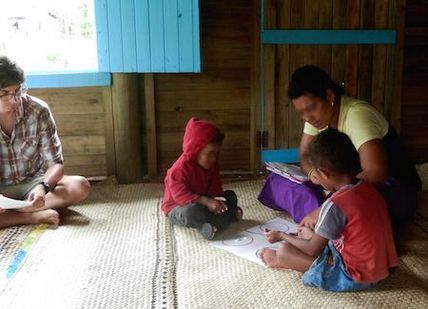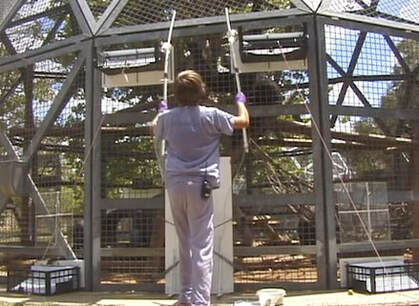Culture and Social DevelopmentThis program studies how prosocial behavior changes across development, in response to both (1) an increasing sensitivity to social norms and (2) the maturation of psychological mechanisms for reciprocal cooperation.
Using behavioral experiments with children and adults living in different societies around the world, I study how a common human psychology for learning social norms leads to cultural diversity in behavior, while a common psychology for reciprocity will lead to similar patterns of behavior. The goal of this work is to better understand how culture and psychological maturation work together to produce human diversity in cooperation and other behaviors. |
Species Differences in Behavior This program studies how human prosocial behavior differs from prosocial behavior in other primate species.
Using behavioral experiments with chimpanzees, I study how these animals make choices that benefit others, and compare their choices to the choices of humans in very similar kinds of situations. This gives us insight into (1) the ways that humans are different from other animals and (2) how these differences emerge from uniquely human capacities for culture. The goal of this work is to draw clearer conclusions about the nature of the evolved psychological adaptations that produce uniquely human cooperative behaviors. |
Publications
House, B.R., Kanngiesser, P., Barrett, H.C., Broesch, T., Cebioglu, S., Crittenden, A.N., Erut, A., Lew-Levy, S., Sebastián-Enesco, C., Smith, A.M., Yilmaz, S., Silk, J.B. (2019)
Universal norm psychology leads to societal diversity in prosocial behaviour and development. Nature Human Behaviour.
pdf link
House, B.R. and Tomasello, M. (2018)
Modeling social norms increasingly influences costly sharing in middle childhood. Journal of Experimental Child Psychology.
pdf link
House, B.R. (2018)
How do social norms influence prosocial development? Current Opinion in Psychology.
pdf link
House, B.R. (2016)
Diverse ontogenies of reciprocal and prosocial behavior: cooperative development in Fiji and the United States. Developmental Science.
pdf link
Silk, J.B., House, B.R. (2016)
The evolution of altruistic social preferences in human groups. Philosophical Transactions of the Royal Society B.
pdf link
House, B.R., Lambeth, S., Schapiro, S., Silk, J.B. (2014)
Task Design Influences Prosociality in Captive Chimpanzees (Pan troglodytes). PloS One.
pdf link
House, B.R., Silk, J.B., Henrich, J., Barrett, H.C., Scelza, B., Boyette, A., Hewlett, B.S., McElreath, R., Laurence, S. (2013).
Ontogeny of prosocial behavior across diverse societies. Proceedings of the National Academy of Sciences.
pdf link
House, B.R., Henrich, J., Sarnecka, B.W., & Silk, J.B. (2013).
The development of contingent reciprocity in children. Evolution and Human Behavior.
pdf link
Frankenhuis, W.E., House, B.R., Barrett, H.C., Johnson, S.P. (2013)
Infants’ perception of chasing. Cognition.
pdf link
House, B.R., Henrich, J., Brosnan, S.F., Silk, J.B. (2012).
The ontogeny of human prosociality: behavioral experiments with children aged 3 to 8. Evolution and Human Behavior.
pdf link
Silk, J.B, House, B.R. (2012).
The Phylogeny and Ontogeny of Prosocial Behavior. In Vonk, J. and Shackelford, T. (Eds.), The Oxford Handbook of Comparative Evolutionary Psychology. link
Silk, J.B., House, B.R. (2011).
Evolutionary foundations of human prosocial sentiments. Proceedings of the National Academy of Sciences.
pdf link
Universal norm psychology leads to societal diversity in prosocial behaviour and development. Nature Human Behaviour.
pdf link
House, B.R. and Tomasello, M. (2018)
Modeling social norms increasingly influences costly sharing in middle childhood. Journal of Experimental Child Psychology.
pdf link
House, B.R. (2018)
How do social norms influence prosocial development? Current Opinion in Psychology.
pdf link
House, B.R. (2016)
Diverse ontogenies of reciprocal and prosocial behavior: cooperative development in Fiji and the United States. Developmental Science.
pdf link
Silk, J.B., House, B.R. (2016)
The evolution of altruistic social preferences in human groups. Philosophical Transactions of the Royal Society B.
pdf link
House, B.R., Lambeth, S., Schapiro, S., Silk, J.B. (2014)
Task Design Influences Prosociality in Captive Chimpanzees (Pan troglodytes). PloS One.
pdf link
House, B.R., Silk, J.B., Henrich, J., Barrett, H.C., Scelza, B., Boyette, A., Hewlett, B.S., McElreath, R., Laurence, S. (2013).
Ontogeny of prosocial behavior across diverse societies. Proceedings of the National Academy of Sciences.
pdf link
House, B.R., Henrich, J., Sarnecka, B.W., & Silk, J.B. (2013).
The development of contingent reciprocity in children. Evolution and Human Behavior.
pdf link
Frankenhuis, W.E., House, B.R., Barrett, H.C., Johnson, S.P. (2013)
Infants’ perception of chasing. Cognition.
pdf link
House, B.R., Henrich, J., Brosnan, S.F., Silk, J.B. (2012).
The ontogeny of human prosociality: behavioral experiments with children aged 3 to 8. Evolution and Human Behavior.
pdf link
Silk, J.B, House, B.R. (2012).
The Phylogeny and Ontogeny of Prosocial Behavior. In Vonk, J. and Shackelford, T. (Eds.), The Oxford Handbook of Comparative Evolutionary Psychology. link
Silk, J.B., House, B.R. (2011).
Evolutionary foundations of human prosocial sentiments. Proceedings of the National Academy of Sciences.
pdf link


